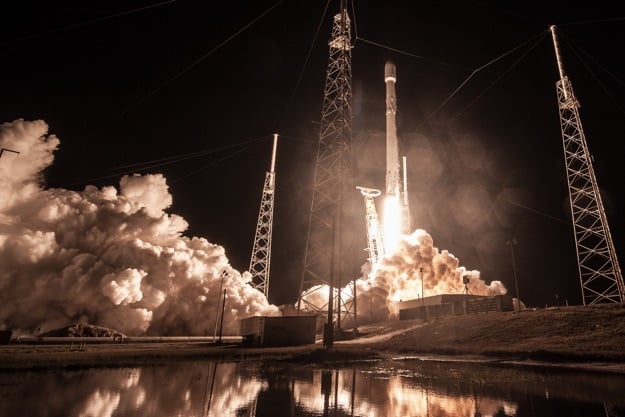SpaceX Says Don't Blame Us After Secret Zuma Military Satellite Fails Shortly After Falcon 9 Launch

The Falcon 9 rocket was able to make a successful powered landing back on the ground after separating from the upper stage. However, SpaceX censored critical portions of the launch, including the separation of the nose cone surrounding the top-secret Zuma satellite, and the satellite’s actual deployment into earth's orbit. However, these censored bits are par for the course when it comes to SpaceX's missions for the government.
What makes things tricky is the fact that the satellite failed to achieve orbit, reportedly burning up in the earth's atmosphere. And the secretive nature of the mission is making it hard to determine the real reasons behind this expensive destruction of taxpayer money. As far as we can tell from reporting by both the Wall Street Journal and Bloomberg, the Zuma satellite failed to successfully separate from the upper stage.

The Falcon 9 booster successfully made it back to earth under its own power...
For its part, SpaceX seems to be shifting the blame away from itself, and said in a statement, "We do not comment on missions of this nature; but as of right now reviews of the data indicate Falcon 9 performed nominally." However, if the Zuma failed to separate from the upper stage as multiple reports suggest, how does at least part of the blame not lay with SpaceX?
Gwynne Shotwell, President and COO of SpaceX, issued the following statement on Tuesday to clarify the company's position on the mission:
For clarity: after review of all data to date, Falcon 9 did everything correctly on Sunday night. If we or others find otherwise based on further review, we will report it immediately. Information published that is contrary to this statement is categorically false. Due to the classified nature of the payload, no further comment is possible.
Shotwell went on to state that this latest mishap will have no bearing on future SpaceX launches, and that Falcon Heavy is being prepped for its maiden flight.
As for Northrop Grumman, the manufacturer of the Zuma satellite, it simply added “we cannot comment on classified missions.” Rep. Mike Rogers, who leads the House Armed Services Strategic Forces subcommittee, added rather bluntly that "space is a risky business", but that his committee will continue to provide oversight for future missions tasked with protecting national security.
Senator Bill Nelson (D-FL), who previous flew into space in the 1980s aboard Columbia as a payload specialist, sided with SpaceX, stating, “The first statement by SpaceX was that the failure to achieve orbit was not theirs.”
On the other hand, Senator Richard Shelby (R-AL), was not as lenient on SpaceX. “The record shows they have promise, but they’ve had issues as a vendor. [United Launch Alliance], knock on wood, they’ve had an outstanding record.” For the record, Shelby has been a vocal proponent of ULA, which is a competitor to SpaceX for government contracts, as it has operations in his home state of Alabama.
It should be noted that that the Zuma mission was originally slated to blast off in November 2017. However, SpaceX decided to delay the launch to deal with some issues regarding the payload fairing (nose cone).
"We have decided to stand down and take a closer look at data from recent fairing testing for another customer," said SpaceX communications director John Taylor at the time. "Though we have preserved the range opportunity for tomorrow, we will take the time we need to complete the data review and will then confirm a new launch date."
Is that same payload fairing issue what doomed the Zuma mission earlier this week?

